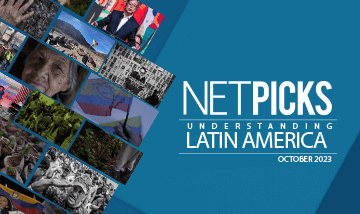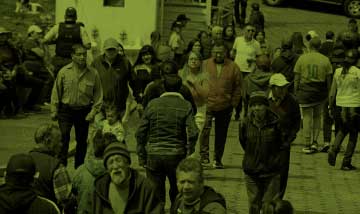Índice
- THIS LAWYER SHOULD BE WORLD-FAMOUS FOR HIS BATTLE WITH CHEVRON – BUT HE’S IN JAIL
- CONSTITUENT POWER
- HOW COLOMBIAN FEMINISTS DECRIMINALIZED ABORTION: WITH HELP FROM THEIR NEIGHBORS
- A THIN LINE DIVIDES VICTIMS AND PERPETRATORS IN THE WAR ON DRUGS IN MEXICO
- ELECTIONS IN COLOMBIA: PROSPECTS FOR CHANGE AND LACK OF GUARANTEES
- WAR DOSSIER
Understanding Latin America
Dear readers and colleagues, this month we bring you six articles that reflect the reality of Latin America: one each from Ecuador, Mexico, Venezuela, and two from Colombia, plus a Dossier of articles from the Rosa Luxemburg Foundation on the war in Ukraine and the challenge it presents for the left.
- This lawyer should be world-famous for his battle with Chevron – but he’s in jail
- Venezuela: Constituent Power
- How Colombian feminists decriminalized abortion: with help from their neighbors
- A thin line divides victims and perpetrators in the war on drugs in Mexico
- Elections in Colombia: prospects for change and lack of guarantees
- War Dossier. Against a New War in Europe: a series of articles on the war in Ukraine presented by The Rosa Luxemburg Foundation
.
THIS LAWYER SHOULD BE WORLD-FAMOUS FOR HIS BATTLE WITH CHEVRON – BUT HE’S IN JAIL
From 1964 to 1990, the US oil company Texaco, which merged with Chevron in 2001, allegedly spilled more than 16m gallons of crude oil and 18bn gallons of polluted wastewater in the Ecuadorian Amazon. In 1993, Steven Donziger, a recent graduate from the Harvard law school, began working on an environmental case on behalf of Ecuadorians allegedly affected by Texaco’s drilling. The case became a 30,000-person class action suit in a New York federal court, but the company lobbied to move the legal proceedings back to Ecuador, where it lost, and later argued that the Ecuadorian legal system was too corrupt to trust. In 2011 Chevron sued Donziger and other members of the lawsuit, accusing them of extortion, Donziger spending more than 800 days under house detention while awaiting the outcome of the trial. The company won. As a consequence of the charges against him, Donziger lost his legal license and as of 2020, according to The Intercept’s Sharon Lerner, his bank accounts were frozen and a lien had been put on his apartment. In August 2019, his passport was seized and he was placed under house arrest. In October of 2021, Donziger began a six-month contempt sentence, but in December was able return to house arrest as part of a Covid-related early-release program. He still cannot make a living as a lawyer, cannot collect legal fees from the Ecuador judgment, and wore an electronic ankle bracelet until very recently. Since the litigation started in 1993, Chevron has not paid a cent or performed any cleanup.
Erin Brockovich. February 8th, 2022.
https://www.theguardian.com/commentisfree/2022/feb/08/chevron-amazon-ecuador-steven-donziger-erin-brockovich
.
CONSTITUENT POWER
In this conversation with ex head of the Venezuelan Commune Ministry, Reinaldo Iturriza, the author discusses various aspects of the present situation in the country: the underappreciation of the role of the popular sectors in establishing and maintaining Chavismo, the entrenchment of a representative, clientelist attitude within the government, and a reinforcing ‘humanitarian’ anti-Chavista discourse which views the population as victims dependent on outside help. Iturriza also discusses the post Chavez changes in the PSUV and the divisions within the party and government that he sees as “rooted in class contradictions and political antagonisms within Chavismo itself”: divisions that have led to the center of gravity moving from the popular sectors to the bourgeoisie. But the scenario is not so straightforward. The local sectors, the communes that were set up as a way to create a real democracy, have been fighting back against the arbitrary and undemocratic of both the bureaucracy and entrenched political elites. This process may, he says, enable the Bolivarian Revolution to recover its lost vitality.
Geo Maher. February 3rd, 2022.
https://newleftreview.org/sidecar/posts/constituent-power
.
HOW COLOMBIAN FEMINISTS DECRIMINALIZED ABORTION: WITH HELP FROM THEIR NEIGHBORS
In contrast to the United States, where the right to abortion is under threat, a tectonic shift is taking place in Latin America, a conservative region where access has long been severely limited. But now Colombia has joined Mexico, and Argentina (where abortion was legalized in September of 2021 and late 2020 respectively) and latterly Ecuador, in knocking down barriers. In promoting their cause, Colombian advocates made use of the tactics of their neighbors in Mexico and Chile, with campaigns on Twitter, TikTok, Instagram and Facebook, a radio campaign targeting areas with limited connectivity, and a reggaeton song performed in the streets, while also adopting the green handkerchiefs that emerged in Argentina as a symbol of the movement. And in September 2020 a group of lawyers from the recently formed Causa Justa coalition sent a petition to the Constitutional Court, arguing that in practice, the existence of a law criminalizing abortion violated a woman’s “fundamental right” to voluntary termination of pregnancy under the exceptions laid out in a 2006 judgment won by Colombian lawyer Monica Roa and the La Mesa por la Vida y la Salud de las Mujeres. This time the judges voted 5 to 4 in favor. “It’s now an inspiration going south to north,” said a Colombian lawyer and member of Causa Justa, “We are going to inspire people in the United States to defend the rights set out in Roe v. Wade.”
Julie Turkewitz. February 23rd, 2022.
https://www.nytimes.com/2022/02/23/world/americas/colombia-abortion.html
.
A THIN LINE DIVIDES VICTIMS AND PERPETRATORS IN THE WAR ON DRUGS IN MEXICO
Mexico is the country with the fourth highest rate of violence in the world, and remains the world leader in the production and trafficking of illegal drugs such as heroin, marijuana, methamphetamines and synthetic opioids such as fentanyl. And although Presidents Enrique Peña Nieto and Andrés Manuel López Obrador have attempted to combat the phenomenon, their military strategy has not been a success. The plan was a mistake says the author, considering that the most important aspect to take into account is the systemic conditions which enable violence linked to organized crime to spread. There is no use in deploying the army on the streets, she states, if many children and young people are willing to replace those who have been killed as members of drug gangs, and to die if necessary. The author analyzed 33 life stories of former drug traffickers; the participants had three common features: most were victims of domestic violence, child abuse or domestic and gang violence, dropped out of school or were expelled before completing primary school, and had several suicide attempts. This structural gender-based violence and child abuse, considered ‘micro’ because it occurs in homes, schools, and neighborhoods, is the key to understanding how the ‘macro’ violence of organized crime is sustained. Ultimately, she says, these stories confirm that violent criminals are not born but made, and that by redirecting state resources to ‘micro’ violence, it may be possible to break the cycles of abuse and suffering that provide a workforce for organized crime.
Karina García Reyes. February 24th, 2022
https://blogs.lse.ac.uk/latamcaribbean/2022/02/24/a-thin-line-divides-victims-and-perpetrators-in-the-war-on-drugs-in-mexico/
.
ELECTIONS IN COLOMBIA: PROSPECTS FOR CHANGE AND LACK OF GUARANTEES
One of the most important of the many elections and referendums held in Latin America in 2022 is that of Colombia. Here the elections are not simply a matter of electing a President and congressional representatives, but are also crucial for the future of an unfinished peace process. Activity begins on March 13th with parliamentary elections, while on the same day the various political parties will elect their presidential candidates through internal consultations. Leading the Presidential race is the leftist Gustavo Petro, a former Mayor of Bogotá, who will almost certainly win his Historic Pact coalition’s nomination; Petro is ahead in the polls, with governing party candidate, Oscar Zuluaga, trailing far behind. What best explains a situation almost unthinkable a few years ago, says the author, is the national protest of 2021, when 44 homicides were allegedly committed by security forces (another 29 remain undetermined) 1,617 people were victims of physical violence, and 2,005 arbitrarily detained. On the other hand, he says, it is not clear whether the electoral process will be able to consolidate the country’s precarious peace: more than 600 social leaders and human rights defenders have been killed since the Havana peace agreements, more than 90 massacres committed in 2021, with 14 massacres reported so far this year. Criminal gangs have also made death threats to Petro, in a country where seven presidential candidates have been assassinated in the last century.
Lautaro Rivara, February 21st, 2022
https://www.counterpunch.org/2022/02/21/elections-in-colombia-prospects-for-change-and-lack-of-guarantees/
.
WAR DOSSIER
The Russian attack on Ukraine, which constitutes a clear violation of international law, brings to Europe the most serious military conflict since the Yugoslav Wars. There are explosions in many cities and regions of Ukraine. People are fleeing. The escalation is claiming many victims, including civilians, more with every day of the war. In a series of articles presented by The Rosa Luxemburg Foundation, we look at the background and consequences of the war in Ukraine. We analyze the causes of the conflict and take a closer look at the situation of people affected by the war. We also listen to left-wing voices from Ukraine and Russia, discuss the possibilities of a peaceful solution to the conflict, and ask what needs to be done to stop the war.
We invite you to read the dossier on the war in Ukraine, and the challenges it presents for the Left:





